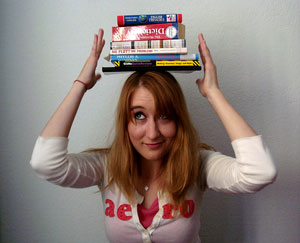
Source: Reference books, radarxlove, Flickr
Print Resources
If you do not have access to electronic resources, you can look for print resources to help you with new or unfamiliar words. Check your classroom or library for the availability of dictionaries, thesauruses, and other vocabulary-related books similar to those listed in the electronic resources section. If possible, it’s a good idea to get your own copies of these resources to use at home. Print resources can also help you develop stronger reading and writing skills.
Be sure these resources are appropriate to your age and academic level. As a high school student, you don’t want to waste time trying to find words you don’t know in a beginner’s dictionary.
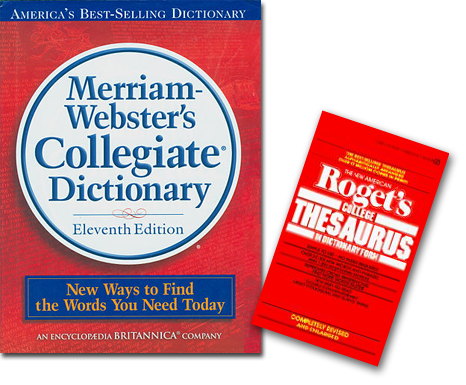
Source: Roget’s College Thesaurus, librarything
Source: Merriam Webster Dictionary, writehisanswer
Review this entry for the word “dictionary” in Merriam-Webster’s Collegiate Dictionary. Notice how similar an entry in a print dictionary is to an online entry. Both contain similar features: phonetic spelling and pronunciation, the part of speech, spelling variations of the word, the etymology, and definitions. Unlike the online Merriam-Webster dictionary, you cannot easily click on a thesaurus to find synonyms.
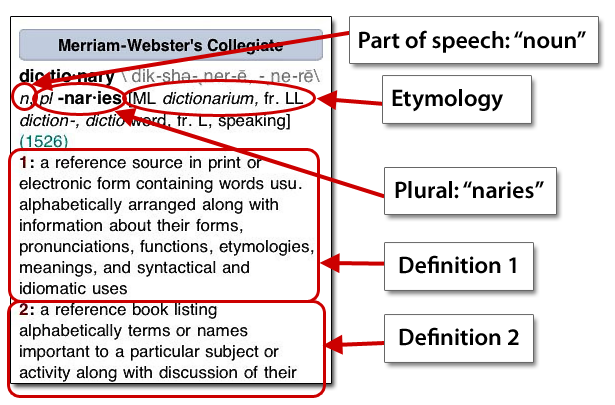
Source: Screenshot, Merriam-Webster online, IPSI
Now take a look at a thesaurus in print:
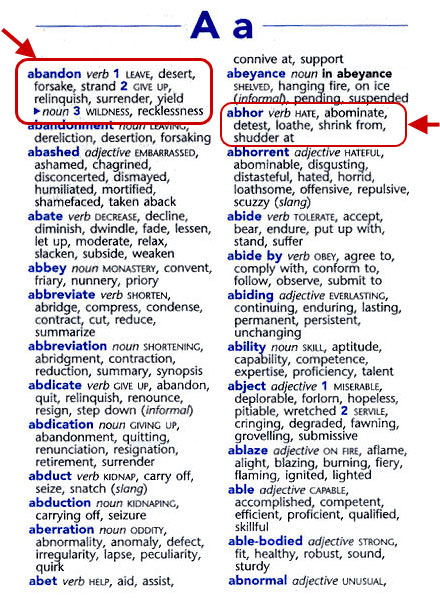
Source: Harper Collins Pocket Thesaurus Example Page, Harper Collins
Do you see how a thesaurus differs from a dictionary? It does not include pronunciations or definitions. It only provides the part of speech, synonyms, and antonyms.
A thesaurus can help you choose a word that may have more punch than the word you were originally going to use—a word with more connotative power. Look at the thesaurus page above. If you were going to use abandon in a sentence, but you really wanted a word with a more negative connotation, you could use forsake.
Here is another example:
Beth abhors chocolate sprinkles on her ice cream.
The use of abhor instead of hate adds connotative power to this statement. You get the sense of just how intensely Beth dislikes sprinkles on ice cream. Here's another example using the word loathes. Which word do you think provides a more powerful connotation?
Beth loathes chocolate sprinkles on her ice cream.
You now get the feeling that she really, really hates those sprinkles!
Do you see how a thesaurus helps you choose just the right word when you’re writing an essay or short story? A thesaurus will also help you expand your vocabulary when you’re reading.
Below is an excerpt from the glossary of a social studies textbook. A glossary typically provides a basic contextual definition that explains how the word or phrase is used in that book. A glossary entry does not have the additional features that a dictionary or thesaurus has. Glossaries alphabetically list terms that are textbook- and course-specific. Look at the circled phrase on the glossary page: space race. If you tried to look this term up in a dictionary, you probably wouldn’t find it. You would need to look up space and race separately, and you probably already know the definitions of those words. Your best bet would be to flip to the glossary in the textbook, usually located in the back near the index, and find space race.
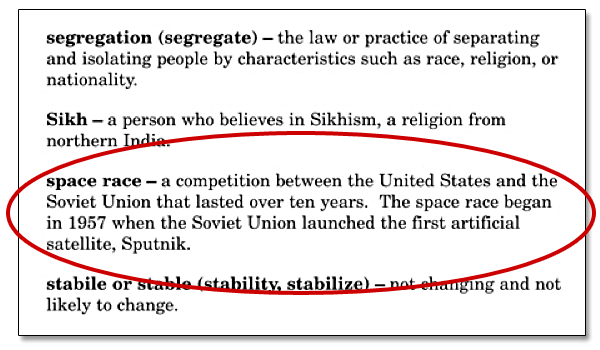
Source: New Little Book Glossary example, New Little Book
Now answer some questions about the print resources we just reviewed. Refer to the images above to help you with your answers.
- The word dictionary is derived from what two languages?
- What does the word Sikh mean?
- If you were going to add connotative power to the word abject, a good choice would be—
- How do you spell the plural form of dictionary?
By the way, the abbreviation fr. used in the etymology about the word dictionary does not mean “French”; it actually means from!